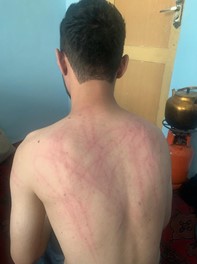Afghan Witness changed the name of the individual interviewed.
Jamal, not his real name, is 29 and was born in Kabul during the civil war. Like most people in Afghanistan, he is no stranger to conflict.
“I was born and raised in war,” he says.
In school, Jamal aspired to become a reporter, and after high school, began studying journalism at one of the public universities. After graduating, he became a journalist, covering conflict and security-related stories.
“During my reports, I saw blood, bones, and pieces of flesh left from the victims,” he tells Afghan Witness (AW), adding that this “deeply traumatised” him.
“I even lost some of my close friends to suicide bombings … they were also reporters.”
Jamal says he was very close to a suicide bombing that targeted a group of journalists in Kabul in 2018.
“Although I knew that I might die in one of those incidents, I kept my commitment to reporting,” he adds.
Facing restrictions
Several months into the Taliban takeover, human rights organisations began raising the alarm on media restrictions. Journalists attempting to cover women’s and human rights protests have faced disruption and, in some cases, violence.
According to the Federation of Journalists and Media Institutions of Afghanistan, 22 cases of violence against journalists and five media outlets closing down have been reported in March alone.
Restrictions against the media show no signs of stopping; this week, the Taliban ordered that international broadcasters be removed from the airwaves, including BBC television news, whose bulletins in Pashto, Farsi and Uzbek were taken off air.
While many journalists have fled the country, when the Taliban returned Jamal decided to shift his focus to the activities of the former Afghan National Security and Defence Forces, reporting as a freelance journalist.
He tells AW that in September last year, he attempted to report on a human rights protest. According to Jamal, the Taliban checked his phone, and found documents and photos concerning his reports on former military and security personnel.
“They detained me for a day, tortured me, and released me,” Jamal says. “After three days, they asked me to come for questioning, and I moved from my place to another location until the house searches began.”
The Taliban have denied targeted reprisals and claim their house searches earlier this year targeted criminals, however, there have been widespread claims that ordinary citizens were also targeted, and the recent reported arrests of several prominent female activists have also raised concerns.
 Image sent to AW by Jamal. He says he was detained for a day by the Taliban, and was tortured before being released.
Image sent to AW by Jamal. He says he was detained for a day by the Taliban, and was tortured before being released.
“No reporter is safe”
Jamal tells AW that he left Afghanistan and is currently living in a neighbouring country, where he lives “in terrible conditions” and still fears for his life.
“Currently, I am depressed; believe me, I have slept on the street [and] in the park,” he says. “I tried to contact every media organisation to ask for help, but I received no reply and no support from them in terms of finance, shelter, or asylum. I do not feel safe here, neither physically nor mentally.”
“I no longer see my future in Afghanistan: media channels are strictly restricted, freedom of speech does not exist anymore, and people live in constant fear. No reporter is safe, neither economically – nor physically and personally.”
Jamal describes his future as “blank”, but he says that if he is evacuated to a safe country, he “may be able to continue working as a journalist.”
“Before the Taliban, my only wish was to have more freedom: equality for men and women, human rights maintained, minorities to have equal rights,” Jamal says.
“I truly wanted a safe, free and stable Afghanistan.”


